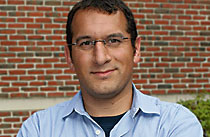Asad Mahmood Butt '01

Asad Mahmood Butt '01
When Asad Mahmood Butt graduated from Bates in 2001, he wanted to embark on a career that would “foster a better understanding of Muslims and Muslim stories in America, create a better awareness of us and our issues.”
Three and a half months after he left the safe nest of Bates, Middle Eastern terrorists who were also Muslims flew planes into the World Trade Center and the Pentagon.
After Sept. 11, fostering that understanding “became my main goal. I can’t just sit here and have people hijack my religion and use it in a negative way,” he says. At the time he was learning the news business by immersion, working at both Channel 7 and WBUR, Boston’s National Public Radio station. One day at WBUR, the managing editor runs in asking how to pronounce “Peshawar.”
“She said, ‘It’s urgent, we’re about to go on the air.’ I look up and say, ‘It’s “Peh-SHAW-wer.” She says ‘Are you sure?’ I said, ‘Of course I’m sure, my parents are from there.’”
The lesson? “I realized American Muslims needed to do a better job at getting themselves involved in the media, more involved in the creative fields. It’s important Muslims have a presence.”
Then there was the time he tried to do a news segment, part of a graduate course in journalism, in front of the Kennedy Federal Building in Boston for a story on immigration issues.
He set up the camera, got the mike ready, and started recording. Then, whoosh — within moments he’d been whisked inside, where he was questioned by federal officers. Had Butt been racially profiled, or did the incident merely reflect real-world, post-Sept. 11 security? Either way, “it left a really sour taste in my mouth. It just hurt.”
After a stint in 2004 and 2005 with the news operation at Bridges TV, an American Muslim television network, Butt is with Empower Peace, a nonprofit arm of his employer The Rendon Group Productions. He connects high school students in the Middle East with their counterparts in the United States. For two hours, via the Internet, these kids share and compare their lives. One recent session connected students in Islamabad, Pakistan, with classes in Cairo, New York, and Boston.
“I went to Islamabad, and the kids were so excited to be able to explain themselves and talk about their lives, their culture, sports, role models, what they do in their spare time,” he says. “They find out they basically have very similar lives. They watch the same TV shows, they are on the Internet, on MySpace, and they have to deal with peer pressure.
“You work day to day in the real world, where everything is deadlines and bottom lines, and you become pessimistic. It’s nice to see this fresh optimism. I think, if they have it, maybe I should have it too.”